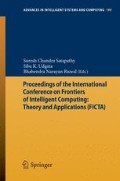Abstract
Protein secondary structure prediction is an essential step for the understanding of both the mechanisms of folding and the biological function of proteins. Experimental evidences show that the native conformation of a protein is coded within its primary structure. This work investigates the benefits of combining genetic algorithms, fuzzy logic, and neural networks into a hybrid Evolutionary Neuro-Fuzzy System, especially for predicting a protein’s secondary structure directly from its primary structure. The proposed system will include more biological information such as protein structural class, solvent accessibility, hydrophobicity and physicochemical properties of amino acid residues to improve accuracy of protein secondary structure prediction. The proposed system will experiment on three-class secondary structure prediction of proteins, that is, alpha helix, beta sheet or coil. The experimental results indicate that the proposed method has the advantages of high precision, good generalization, and comprehensibility. The method also exhibits the property of rapid convergence in fuzzy rule generation.
Access this chapter
Tax calculation will be finalised at checkout
Purchases are for personal use only
Preview
Unable to display preview. Download preview PDF.
References
Jang, J.-S.R.: ANFIS: Adaptive-Network-Based Fuzzy inference system. IEEE Transactions on Systems, Man and Cybernetics 23(0018-9472), 665–685 (1993)
Baker, D., Sali, A.: Protein Structure Prediction and Structural genomics. Science 294(5540), 93–96 (2001)
Mount, D.W.: Bioinformatics: Sequence and Genome Analysis. Gold Spring Harbor Laboratory Press
Sugeno, T., Yasukawa, M.: A fuzzy logic based approach to qualitative modeling. IEEE Transactions on Fuzzy Systems 1(1), 7–31 (1993)
Kawashima, S., Kenehisa, M.: AAIndex: Amino acid index database. Nucleic Acids Research 28, 374 (2000)
Kasabov, N.K.: Foundations of Neural Networks, Fuzzy Systems, and Knowledge Engineering. MIT Press (1998)
Baldi, P., Brunak, S.: Bioinformatics: The machine learning approach. The MIT Press (2001)
Eberhart, R.C., Shi, Y.: Computational Intelligence: Concepts & Implementation. Morgan Kalfman Publishers (2007)
Takagi, H.: Introduction to Fuzzy Systems. Neural Networks, and Genetic Algorithms
Fausette, L.: Fundamentals of Neural Networks: Architectures, Algorithms, and Applications
Weise, T.: Global Optimization Algorithms: Theory and Applications, 2nd edn (2009)
Author information
Authors and Affiliations
Corresponding author
Editor information
Editors and Affiliations
Rights and permissions
Copyright information
© 2013 Springer-Verlag Berlin Heidelberg
About this paper
Cite this paper
Krishnaji, A., Appa Rao, A. (2013). Evolutionary Neuro-Fuzzy System for Protein Secondary Structure Prediction. In: Satapathy, S., Udgata, S., Biswal, B. (eds) Proceedings of the International Conference on Frontiers of Intelligent Computing: Theory and Applications (FICTA). Advances in Intelligent Systems and Computing, vol 199. Springer, Berlin, Heidelberg. https://doi.org/10.1007/978-3-642-35314-7_3
Download citation
DOI: https://doi.org/10.1007/978-3-642-35314-7_3
Publisher Name: Springer, Berlin, Heidelberg
Print ISBN: 978-3-642-35313-0
Online ISBN: 978-3-642-35314-7
eBook Packages: EngineeringEngineering (R0)

